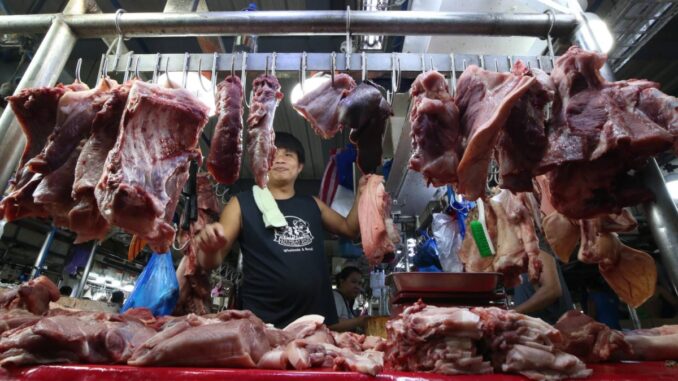
THE Philippines’ meat imports from January to August totaled 907.77 million kilograms, up 11.06 percent from 817.35 million kg in the same period last year, according to data from the Department of Agriculture’s Bureau of Animal Industry (DA-BAI).
Pork accounted for 450.36 million kg or 49.6 percent of total imports, higher by 10.9 percent from the 405.9 million kg a year earlier.
Next was chicken, which comprised 33.2 percent of total meat imports, tallied at 302.02 million kg, up by 4.3 percent from the previous 289.52 million kg.
Beef imports increased the largest at 36.4 percent, reaching 125.01 million kg compared to the year-earlier 91.6 million kg.
The Philippines also ordered 28.75 million kg of buffalo meat, though 1.89 percent lower than the 29.3 million kg the previous year.
Lamb imports at 540,534 kg were 4.04 percent lower than last year’s 563,299 kg.
BAI data showed duck meat imports at 107,370 kg were almost 46.8 percent down from the previous 229,301 kg.
Brazil shipped the largest volume of meat at 313.53 million kg or 34.5 percent of the Philippines’ total imports.
Next were the United States and Spain at 130.8 million kg and 113.12 million kg of meat imports, respectively.
Canada was fourth with 81.54 million kg, followed by Australia, 51.56 million kg; and the Netherlands, 45.6 million kg.
The Meat Importers and Traders Association (MITA) said import volume in August indicates supply will stabilize in the holiday season.
“However, while importers are squeezed, lower prices may not be passed on to the consumers. Other links in the value chain may keep the gains, especially since the market traditionally anticipates higher prices in the last quarter,” MITA president Emeritus Jesus Cham said.
On the other hand, the Manila office of the United States Department of Agriculture’s Foreign Agricultural Services (USDA-FAS) sees the Philippines producing more pork, chicken and beef this year as more investors come in.
The agency’s latest report for 2024 said domestic pork production would spike to 970,000 metric tons (MT) compared to 2023’s forecast of 950,000 MT due to repopulation efforts of the commercial hog sector.
The USDA-FAS also projects the Philippines’ 2024 beef production increasing to 190,000 MT compared to the previous 185,000 MT.
The agency cited Executive Order 62, which lowers import tariffs on agricultural products and will help augment local supplies of chicken to meet strong market demand over the medium term.
In 2023, the Philippine Statistics Authority reported the country produced over 5 million MT of livestock, poultry, and other animal products. The DA said this is a sign of recovery from the impacts of the Covid-19 pandemic and the occurrence of animal diseases.
In the last few months, the DA has lifted most of the temporary bans imposed on domestic and wild birds and livestock from other countries due to bird flu and African swine fever.
The department also announced plans to boost domestic production of livestock and poultry by five times in five years to minimize imports.


Be the first to comment